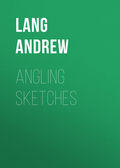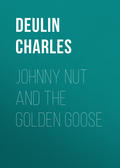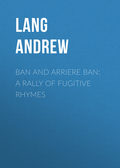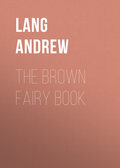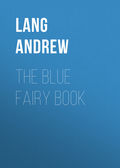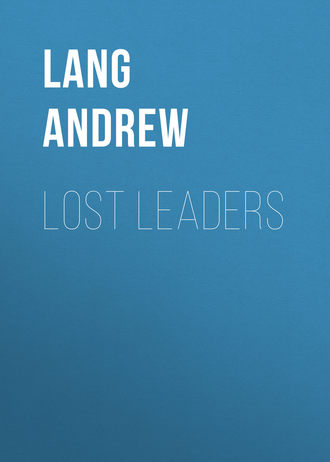
Lang Andrew
Lost Leaders
ON HYPOCHONDRIACS
A nice state we are in, according to the Medical Times. If the secrets of our “casebooks” – that is, we suppose, our medical dossiers, doctors’ records of the condition of their patients – could be revealed, it would be shown that many clever people have a fancy skeleton in their cupboards. By a fancy skeleton we mean, not some dismal secret of crime or shame, but a melancholy and apprehensiveness without any ground in outward facts. With the real skeleton doctors have nothing to do. He rather belongs to the province of Scotland Yard. If a man has compromised himself in some way, if he has been found out by some scoundrel, if he is compelled to “sing,” as the French say, or to pay “blackmail,” then the doctor is not concerned in the business. A detective, a revolver, or a well-planned secret flight may be prescribed to the victim. Other real skeletons men possess which do not come of their own misdeeds. One of their friends or one of their family may be the skeleton, or the consciousness of coming and veritable misfortune, pecuniary or what-not. But the Medical Times, which no doubt ought to know, refers purely to cases of vague melancholy and hypochondriac foreboding. Apparently “The Spleen,” the “English Disease,” is as bad now as when Green wrote in verse and Dr. Cheyne in prose. Prosperous business men, literary gents in active employment, artists, students, tradesmen, “are all visited by melancholy, revealed only to their doctors, and sometimes to their domestic circle.”
Unhappy domestic circle, brooded over by a gloomy parent, who thinks that life is too short, or faith too much a matter of speculation, or that the country is going to the dogs! Then the doctor, it seems, hears his patient, and recommends him only to drink a very little whisky and potash water, or to take two bottles of port every day, or to take to angling, or to give up smoking, or to work less or to work more, or to go to bed early or to get up late, or to ride, or to fence, or to play golf, or to go to Upper Egypt or the Engadine, or anything that fancy may dictate and opportunity suggest. So the kind physician advises his mournful self-tormentor, and then he himself flies round the corner and consults some brother-healer about his own subjective gloom.
Old ladies, in speaking of the misdeeds of youth, are apt to recommend “a good shaking” as a panacea. Really those victims of whom our contemporary speaks, appear to be persons on whom “a good shaking,” mental or physical, would produce a salutary effect. Cowardice, vanity, overweening self-consciousness, are the causes of most melancholy. No doubt it has physical causes too. Dr. Johnson suffered, – one of the best and bravest of men. But most of us suffer – if suffer we do – because we over-estimate ourselves and our own importance. Mr. Matthew Arnold has tried to enforce this lesson. After a horrible murder in a railway carriage, Mr. Arnold observed, with pain, the “almost bloodthirsty clinging to life” of his fellow-passengers. In vain he pointed out to them that even if they were to depart, “the great mundane movement” would go on as usual. But they refused to be comforted. Every man was afraid of meeting his own Müller; and as to the great mundane movement, no one cared a pin. This selfishness is among the chief causes of melancholy. A man persuades himself that he will not live long, or that his prospects in this world or the next are gloomy; or he takes views as absurdly far-reaching as those of the spinsters in the old tale, who wept over the hypothetical fate of the child one of them might have had if she had been married. Now, there is a certain melancholy not unbecoming a man; indeed, to be without it is hardly to be human. Here we do find ourselves, indeed, like the shipwrecked mariner on the isle of Pascal’s apologue; all around us are the unknown seas, all about us are the indomitable and eternal processes of generation and corruption. “We come like water, and like wind we go.” Life is, indeed, as the great Persian says —
“A moment’s halt, a momentary taste
Of being from the well beside the waste.”
These just causes of melancholy and of awe have presented themselves to all reflective men at all times. They deeply affect the thought, so wholesome and so human, of Homer. They express themselves in that old English pagan’s allegory of the bird that flies from the dark into the warm and lighted hall, and from the hall into the dark again. Not to be capable of these reflections is to be incapable of tasting the noblest poetry. Such thoughts actually give zest to our days, and sharpen our enjoyment of that which we have only a brief moment to enjoy. Such thoughts add their own sweetness and sadness to the song of the nightingale, to the fall of the leaves, to the coming of the spring. Were we “exempt from eld and age,” this noble melancholy could never be ours, and we, like the ancient classical gods, would be incapable of tears. What Prometheus says in Mr. Bridge’s poem is true —
“Not in heaven,
Among our easy gods, hath facile time
A touch so keen to wake such love of life
As stirs the frail and careful being of Man.”
Such are the benefits of Melancholy, when she is only an occasional guest, and is not pampered or made the object of devotion. But Melancholy, though an excellent companion for an hour, is the most exacting and depressing of mistresses. The man who gives himself up to her, who always takes too long views, who broods on the future of this planet when the sun has burned out, is on the high-way to madness. The odds are that he does not travel all the way. He remains a self-tormented wretch, highly profitable to his medical man, and a frightful nuisance to his family. Now, there are, of course, cases in which this melancholy has physical causes. It may come of indigestion, and then the remedy is known. Less dining out (indeed, no one will ask the abjectly melancholy man out) and more exercise may be recommended. The melancholy man had better take to angling; it is a contemplative pastime, but he will find it far from a gloomy one. The sounds and sights of nature will revive and relieve him, and, if he is only successful, the weight of a few pounds of fish on his back will make him toss off that burden which poor Christian carried out of the City of Destruction. No man can be melancholy when the south wind blows in spring, when the soft, feathery March-browns flit from the alders and fall in the water, while the surface boils with the heads and tails of trout.
Perhaps, on the other hand, the melancholy one lives too much in the country. Then let him go to Paris or Vienna; let him try the Palais Royal, and spend a good deal of money in the shops. A course of this might have cured even Obermann, whom there was nothing to check or divert while he kept philandering on the mountains with the snows and his woes. There are plenty of such cures for a melancholy not yet incurable; change of air, scene, food, amusement, and occupation being the best. True, the Romans tried this, as Seneca and Lucretius tells us, and found themselves as much bored as ever. “No easier nor no quicker passed th’ impracticable hours.” But the Romans were very extreme cases.
When the cause of melancholy is religious or moral, there is little to be done with the victim. In “Sartor Resartus” he will read how Mr. Carlyle cured himself, if ever he was cured. To be brief, he said, “What then, who cares?” and indeed, in more reverent form of expression, it is all that can be said. When Nicias addressed the doomed and wasted remnant of the Athenian expedition to Syracuse, he told them that “others, too, being men, had borne things which had to be endured.” That is the whole philosophy of the matter.
THACKERAY’S LONDON
A house in a highly respectable square, where Jeames Yellowplush was in service, had recently the fame of being haunted. No one knew exactly what haunted this desirable mansion, or how, though a novelist was understood to have supplied a satisfactory legend. The young man who “investigated” the ghost rang the bell thrice violently, and then fell down dead, nor could he in any wise satisfy the curiosity of his friends. That fable is exploded. It was what is called an “ætiological myth;” by the learned it was merely a story devised to account for the fact that the house was not occupied. The imagination of man, confronted by so strange a problem as money running to waste, took refuge in the supernatural. Much more truly haunted than the house in “Buckley Square” are the streets of London which are tenanted by the ghosts that genius created. These, having never been born, can never die, and still we may meet them in the roads and squares where they lived and took their pastime. Mr. Rideing, an American author, has published (with Messrs. Jarvis and Son) a little volume called “Thackeray’s London,” an account of the places which that great novelist made household words, and filled with genial spectres that time can never lay. Mr. Rideing’s little book does not strike us as being quite complete. Surely Thackeray, especially in the “Ballads,” mentions many places not alluded to by the new topographer. Besides, Mr. Rideing says that Thackeray’s readers forget the localities in which his characters appear. Surely this is a calumny on human memory. Who but thinks of Becky Sharp as he trudges down Curzon Street? Has Bryanston Square properly any reason for existence, except that the Hobson Newcomes dwelt there? Are the chambers of Captain Costigan forgotten by the memory of any man, or those of Pen and George Warrington? But Pen took better rooms, not so lofty, when he scored that success with “Walter Lorraine.” Where did Mr. Bowes, the hopeless admirer of the Fotheringay, dwell? Every one should know, but that question might puzzle some. Or where was the lair of the Mulligan? Like the grave of Arthur, or of Molière, it is unknown; the whole of the postal district known as W. is haunted by that tremendous shade. “I live there,” says he, pointing down towards Uxbridge with the big stick he carries; so his abode is in that direction, at any rate. No more has been given to man to know.
Many minor reminiscences occur to the mind. In Pump Court we encounter the brisk little spectre of Mr. Frederick Minchin, and who can forget that his club was The Oxford and Cambridge, than which what better could he desire? Mr. Thackeray himself was a member of The Garrick, The Athenæum, and The Reform, but the clubs of many of his characters, like the “buth” of Jeames Yellowplush, are “wrapped up in a mistry.” They are alluded to by fancy names, but the scholiast on Thackeray will probably be able to identify them. Is it not time, by the way, for that scholiast to give his labours to the public? Thackeray’s world is passing; the children he knew, the boys he tipped and took to the play, are middle-aged men – fogies, in fact. Tempus edax rerum, Time has an appetite as good as that of a boy at his first club dinner. The meaning of the great writer’s contemporary allusions may be lost, like those of Villon and Aristophanes. Such is the fate of comedy. Who knows, if we turn to Dickens, what the “common profeel machine” was, or what were the steps of the dance known as the Fanteag (the spelling is dubious); or what the author meant by a “red-faced Nixon.” Was it a nixie? Does the new Professor of the English Language and Literature at Oxford hope to cast the light of Teutonic research on these and similar inquiries? Sam Weller found that oysters always went hand-in-hand with poverty. How this must astonish a generation which finds the oyster nearly as extinct as the ichthyosaurus! The “Book of Snobs” calls aloud for a commentator. Who is the nobleman holding his boots out of the hotel window – an act which the Snob very properly declined to classify as snobbish? Who are the originals of Henry Foker (this, indeed, is known), and of Wagg and Wenham? Or did Wenham’s real name rhyme to Foker, as, according to the Mulligan, “Perkins rhymes to Jerkins, my man of firkins”? Posterity will insist on an answer, which will be nothing if not authentic. Posterity, pace Mr. Rideing, will remember very well that George Osborne’s father lived in Russell Square, and will hunt in vain for 96. There is no such number, any more than there ever was such a Pope as he to whom the unfortunate old woman in “Candid” attributed her birth. Here once more, as Voltaire justly remarks in a footnote, we observe the discretion of our author.
Colonel Newcome lived, as is well known, in Fitzroy Square, and died in the Charter House. To these shrines the pious go in pilgrimage; the rather dingy quarters are brightened by the memory of his presence, as we think of Scott in Castle Street, Edinburgh, or of Dr. John Brown in Princes Street – Dr. John Brown who was a Colonel Newcome that had gone into medicine instead of the army. Smithfield is hardly more memorable for her martyrs than for the battles fought on neighbouring ground between Biggs and Berry, between Cuff and old Figs. Kentish Town, but little sought for sentimental reasons, is glorified by the memory of Adolphus Larkins; “Islington, Pentonville, Somers Town, were the scenes of many of his exploits.” Brompton, again, passionate Brompton, lent her shelter – or rather, sold it, for the poetess lived in a boarding-house – to Miss Bunnion. Cursitor Street might be unknown as the great men before Agamemnon (many of whom, by the way, as Meleager and Pirithous, are known well enough) had not Cursitor Street contained the sponging-house where Rawdon Crawley was incarcerated.
In addition to these scholia on Thackeray so sadly needed, and so little likely to be published, we need novelists’ maps and topographies of London and Paris. These will probably be constructed by some American of leisure; they order these things better in America. When we go to Paris we want to know where Balzac’s men and women lived, Z. Marcas and César Birotteau, and Le Cousin Pons, and Le Père Goriot, and all the duchesses, financiers, scoundrels, journalists, and persons of both sexes and no character “Comédie Humaine.” London also might be thus spaced out – the London of Richardson, and Fielding, and Miss Burney, as well as the London of Thackeray or Dickens. Already, to speak of to-day, Rupert Street is more interesting, because there, fallen in fortune, but resolute of heart and courtly as ever, Prince Florizel of Bohemia held his cigar divan.
TORRID SUMMER
“Is it very cold?” asks the Prince of Denmark, according to a familiar reading. No one has any occasion to consult the thermometer before answering the question, “Is it very hot?” All things combine to prove that it is very hot. Even the man of metal who used, according to legend, to patrol the coast of Crete, the man with only one vein from head to heel, would admit (could he appear in the Machineries at present) that it is very hot indeed. He might not feel any subjective sensation of heat (for he seems to have been a mythical anticipation of the Conquering Machine which is to dominate the world), but he would have inferred the height of the temperature from a number of phenomena. He would have seen the ticket-clerks in the railway stations with their coats off. He would have observed imitation Japanese parasols at a penny among the ware of enterprising capitalists in the streets. He would have marked the very street-boys in wide, inexpensive straw hats of various and astonishing colours. Woman he would have found in beautiful shades of blue, in such light garments “woven wind” as Theocritus speaks of when he presents the wife of his doctor with a new ivory distaff.
As to men, they in their attire do show their wit or their want of courage, as the case may be. It is not easy for modern man, when he “repairs to the metropolis,” to dress up to the heat of the weather. An ingenious though too hasty philosopher once observed that all men who wear velvet coats are atheists. He probably overstated the amount of intellectual and spiritual audacity to be expected from him who, setting the picturesque before the conventional, dons a coat of velvet. But it really does require some originality even to wear a white hat and a white waistcoat in a London July. The heat is never so great but that the majority of males endure black coats and black shiny hats. The others are in a minority. The voice of public opinion is not on their side. “Who stole the moke, Anna?” asked suspicion; and the answer came, “The man in the chapeau blanc.” There is something daring, something distinctive in a white hat; and it may be doubted whether the amount of comfort obtained by the revolutionary wearer is in a due ratio to the conspicuousness which his action entails on him. Members of Parliament are singularly emancipated from these fears of the brave; but members of Parliament cannot supply the whole contingent of white-hatted men now to be seen in the streets of the metropolis. Their presence proves that it is very hot indeed. One swallow does not make a summer, but half a dozen pairs of “ducks” beheld in public places would mark a summer of unusually high temperature.
There are, of course, alleviations. Nature compensates all who can afford to purchase the compensations. Strawberries, long waited for, shy, retiring fruit, have now nearly approached the popular price of sixpence a basket. A divine of a past generation declared that in his opinion the joys of Paradise would consist of eating strawberries to the sound of a trumpet. For a poor sixpence half of this transcendental pastime may be partaken of, and probably the brass band which is usually round the corner could supply the sound of the trumpet at a small extra charge.
Unluckily, doctors have decided that many of us must not eat strawberries, nor drink champagne cup, nor iced coffee. That is the way with doctors. Æsculapius was originally worshipped in the form of a serpent; in the guise of a serpent he came to Rome. Medical men still hold of their heroic father, and physicians are the serpents in the Paradise of a warm summer. Mortals, in their hands, are like Sancho Panza with his medical adviser. Here is summer, provoking a gentle interest in every method of assuaging thirst, and almost every method is condemned by one member of the faculty or another. Champagne cannot be so royally sound, nor is shandy-gaff so humble, that it ’scapes whipping. How melancholy a thing is human life at best! In boyhood we can eat more ices than our pocket-money enables us to purchase; in maturity we have the pocket-money without the powers of digestion. The French lady said that if strawberry ices were only sinful, no pleasure could exceed that which is to be enjoyed in the consumption of the congealed fruit. Strawberry ices are sinful now, and under the medical ban. The French lady, were she living still, might be at ease on that score. But her audacity is not given to all, and many fall back on that poor creature, lemon-squash, when they are conscious of a thirst worthy of being quenched by the most imperial beverages in imperial quarts.
Men, being reasonable, must hurry about town when the thermometer is at something fabulous, wearing black clothes, going to parties, and larding the lean earth. Beasts are not so foolish. To the pious Brahmin Vishnu accords the power of becoming what animal he pleases, with a break in the lease, so to speak, when circumstances alter. Had a sage this power at this moment he would become a cow, standing up to her middle in the clear, cool water of the Kennet, under the shade of a hanging willow tree. What bliss can equal that of a cow thus engaged? Her life must, indeed, be burning with a hard gem-like flame. She must be plucking the flower of a series of exquisite moments. The rich, deep grass, with the buttercups and forget-me-nots, is behind her, but she has had enough of that, and is open to more spiritual pleasures. The kingfishers and water-wagtails flit about her. The water-rat jumps into the stream with a soft plash, and his black body scuttles along to the opposite bank. The green dragon-flies float hither and thither; the beautiful frail-winged water-flies float over trout too lazy to snatch at them. The cow, in her sensuous nirvana, may see and marvel at the warm boating-man as he tows two stout young ladies in a heavy boat, or labours with the oar. Her pleasure is far more enduring than that of the bathers in the lasher up stream, and she has an enormous advantage over the contemplative man trying to lie on the grass and enjoy nature, for he really is not enjoying nature. The pleasures of lying on the grass are chiefly those of imagination. You cannot get into a truly comfortable position. Your back has a lump of grass under it here, or your arm tingles and “falls asleep,” as children say. No attitude will enable you to read, and the black flies hover around and alight on such of your features as are tempting – to a fly. Then you begin to be quite sure it is damp, and, as you have nothing else to sit on, you sit down on your book, which no one can call comfortable.
The notion of reclining on cushions in a punt is equally fallacious, and, while promising much, ends in a headache. Besides, the river does not always smell very nicely now that it has so long been unrelieved by rain. All through the hot day, in fact, civilized northern man finds loafing very difficult, especially as his Aryan impetuosity is always urging him to do something active. Cows in this climate are the only true lotus-eaters. Next to them in enjoyment comes the angler who approaches the river about eight o’clock, at the time of the “evening rise.” He, like the cow, is knee-deep in water, wading; he listens to the plash of big, hungry trout, sucking down gnats under the alders; he casts over them, and if he catches them, who more content than he, as the sky turns from amber to purple and silvery grey, and the light fades till one cannot thread the gut through the eye-hole of one of the new-fashioned hooks? Certainly this man is more blessed than he who is just coming to the ices at a big, hot London dinner, and knows that his physician has forbidden him this form of enjoyment. What a struggle in that person’s mind! and how almost predestined is his fall! how sure his repentance next morning!



